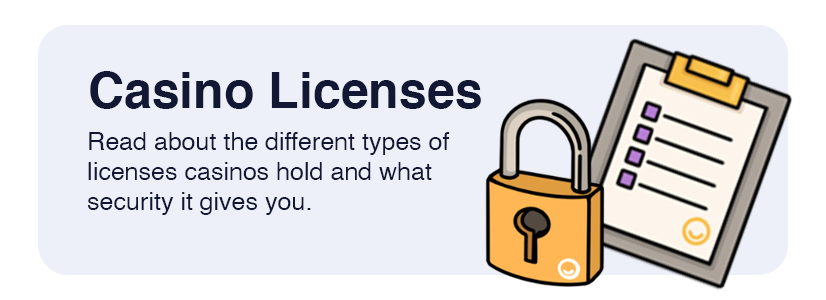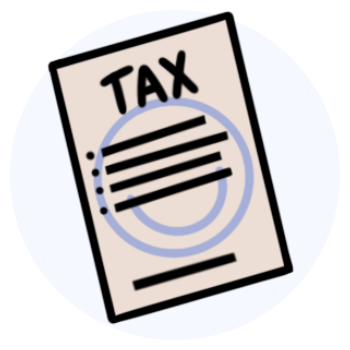Online Casino Licenses
Welcome to our comprehensive guide on casino licenses . The digital world of casinos often seeks authorization in varied regions. These licenses not only add a veneer of authenticity but also enable these platforms to cater to specific areas legally.

This guide dives deep into the rationale and procedures behind casino licensing . We will also shed light on some well-known gaming regulatory authorities.
Browse Casinos by License
Choose a license of interest to better understand its scope and the gambling sites it governs.
Why do online casinos get licensing?
Possessing a license offers numerous benefits for internet casinos. Below, you’ll discover the vital reasons to secure an online casino license.
Gain access to markets
Each gaming authority governs distinct geographic zones. For instance, the United Kingdom Gambling Commission (UKGC) regulates gaming activities within the UK's borders.
To tap into a specific market, casino operators must secure a corresponding license. To legally operate in the UK, for instance, they need to hold a license from the UKGC.
Some casino licenses encompass multiple countries . The Malta Gaming Authority (MGA), for instance, provides licenses that apply to numerous European nations .
Certain jurisdictions restrict their coverage to just one state. Take the New Jersey Division of Gaming Enforcement (DGE), which solely governs New Jersey.
In general, to serve a specific locality, casinos must obtain a relevant license. By ensuring proper authorization, they can legally offer their online gambling services.
Secure a base of operations
While some governments remain undecided on internet gaming, others strictly prohibit online casinos from operating within their borders.
Take Ohio, for example, where there are no stringent anti-online gambling laws. Nevertheless, anyone found illegally running a casino there would face immediate legal actions.
To legally operate, casinos must establish a legal foothold . They can then operate from a licensed jurisdiction.
Inspire trust with customers
Acquiring a license for online casinos involves a meticulous vetting process. They must submit applications, pay fees, and await approval from regulatory authorities.
Players are more likely to trust casinos sanctioned by recognized jurisdictions, in stark contrast to those operating without any license.
Undoubtedly, some jurisdictions impose stricter conditions compared to others. For instance, the UKGC holds operators to higher standards than places like Costa Rica.
Licensing from high-profile regions, such as UKGC, New Jersey DGE, or the Swedish Gambling Authority, enhances an operator’s reputation.

Make banking easier for players
Payment handlers and financial institutions typically avoid partnerships with illegitimate gaming sites to minimize legal complications.
Conversely, law-compliant online casinos often collaborate easily with payment processors, offering players a broader array of banking methods.
Avoid breaking laws
Numerous casinos and gaming platforms have faced severe repercussions for illegally operating in certain jurisdictions. They often end up paying large fines or shutting down.
To avoid such consequences, gaming platforms should ensure compliance through proper licensing processes.
What steps must casinos undertake to acquire a license?
The licensing process varies by jurisdiction. Typically, casinos are required to execute all or most of these steps to achieve approval .
Submit an application
Casino owners must meticulously complete an application to qualify for a license. Regulatory bodies review these applications to assess compliance with their standards.
Considering the complexity of these applications, casinos often enlist the expertise of gaming industry lawyers.
Pay licensing fees and taxes
License acquisition involves significant fees and taxes, and the application itself can be a costly process.
Upon approval, operators may face yearly fees for license maintenance and income taxes.

Commitment to addressing and reducing problem gambling
Legislation for online gambling and regulatory body establishment often include measures to prevent problem gambling, ensuring casinos don't exploit those susceptible to addiction.
Operators should refrain from any misleading promotions suggesting easy wins for gamblers.
Casinos are tasked with reasonably identifying and halting service to problem gamblers, facing substantial fines if found promoting to addicts.
Submit games for testing
Many regulatory authorities necessitate third-party evaluation of games and random number generators to guarantee fair play.
Third-party auditing organizations :
- BMM Testlabs
- Certified Fair Gambling
- eCOGRA
- Gaming Laboratories International
- Technical Systems Testing
Popular licensing jurisdictions
Numerous online gaming regulatory jurisdictions operate worldwide, with some being more popular among casino operators than others.
Curacao eGaming

Over 400 online casinos are licensed by Curacao, drawn by minimal fees and an uncomplicated evaluation process.
Curacao eGaming requires an upfront payment of 60,000 ANG ($33,500) for a master license and an additional 10,000 ANG ($5,500) monthly for two years.
Subsequent to the two years, casinos are mandated to pay a modest 2% income tax and negotiable fees. Hence, Curacao remains one of the more affordable global jurisdictions.
Master license holders can readily issue sub-licenses without extra fees, attractive for operators managing multiple online casino brands.
Malta Gaming Authority

The Malta Gaming Authority (MGA) licenses cover an array of countries globally, presently overseeing more than 500 licensed entities.
An upfront application fee of €2,330 is necessary, alongside a €1,770 system audit fee and annual license expenses ranging from €10,000 to €25,000.
Casino operators also are accountable for a “compliance contribution” between 0.4% and 1.25% of their revenue, capping at €375,000 each year.
New Jersey Division of Gambling Enforcement

While New Jersey DGE supervises just 8.9 million residents, it commands significant respect as a regulator.
Applicants to the DGE pay between $750 and $4,000 in application fees, also subjected to a 15% income tax.
Swedish Gambling Authority

Sweden previously held a monopoly over its online gaming. However, the Swedish Gambling Authority, or Spelinspektionen , has opened its doors to international applicants.
Pursuing an online casino license necessitates an upfront 400,000 SEK ($43,000) fee. Successful applicants must comply with an 18% income tax.
UK Gambling Commission

The UKGC stands as a benchmark in gaming regulation, implementing rigorous vetting and robust problem gambler protections.
This licensing authority demands proof of financial stability and fair gaming assurances from applicants.
Application fees range from £5,711 to £14,647, with annual renewal fees spanning £3,748 to £49,219, contingent on revenue levels.
If there are uncertainties regarding licenses held by a top online casino in the UK or another jurisdiction, verify the license number on the casino’s site online through the UK Gambling Commission's or other regulatory sites.
FAQs
An online casino with the right license can genuinely operate within a stipulated region, like using a Curacao eGaming license to encompass all areas Curacao includes.
Licensing adds credibility since it indicates a platform underwent and passed scrutiny.
Technically, gaming sites can function without a license; they can operate much like any licensed casino.
However, unlicensed sites encounter these issues:
1. Lack of trustworthiness.
2. Limited payment processor options (often relying on cryptocurrencies).
3. Illegal operations in regions due to lack of proper licensing.
While unlicensed casinos aren't inherently corrupt, licensed venues typically hold more credibility.
Most casino proprietors hire legal experts to assist with their licensing applications. Post-application, they await authority approval.
Operators must adhere to the appropriate licensing fee payment. Costs during the application span vary greatly, sometimes reaching significant amounts.
Once submission and fees are completed, the regulatory body reviews and might approve the casino's application.
Gaming authorities can rescind licenses from operators breaching compliance, such as the UKGC. revoked Bodugi Limited’s license for multiple violations in April 2014.
In some instances, authorities responsible for regulation might impose penalties on gaming operators. These financial penalties often occur when an online casino promotes deceptive advertisements.
When a player encounters an issue with an internet casino, they have the option to reach out to the pertinent licensing authority. From there, the governing body may decide to mediate and resolve the conflict or opt not to intervene.
Top-tier licensing jurisdictions, such as the New Jersey Division of Gaming Enforcement (DGE) and the United Kingdom Gambling Commission (UKGC), uphold rigorous protocol for resolving these disputes. In contrast, jurisdictions like Costa Rica and Belize may not actively engage in such resolutions.